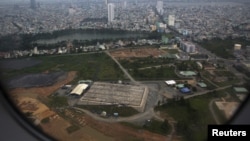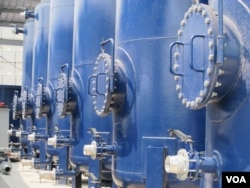Vietnam is demanding compensation from manufacturers of Agent Orange in what experts describe as a last resort for helping citizens who still fall sick or face disabilities linked to the defoliant the United States used during war in the country five decades ago.
The foreign ministry in Hanoi asked Thursday that Monsanto and other U.S. firms compensate victims of Agent Orange, the Vietnamese news outlet VnExpress International reported.
Vietnam made the demand after a U.S. jury ordered Monsanto to pay damages to an American cancer patient with claims that he was exposed to a weed killer produced by the same company.
Vietnam’s latest demand, emboldened by the U.S. jury’s decision, follows the 2005 loss of a class action lawsuit brought by Vietnamese citizens to a federal judge in New York.
The government also hopes to avoid a world court filing, which would be state-to-state rather than aimed at a company and could hurt otherwise stable political relations with the United States, said Trung Nguyen, director of the Center for International Studies at Ho Chi Minh University of Social Sciences and Humanities.
“Vietnam sees the verdict against Monsanto as setting legal precedent which overrides previous claims that the herbicides made by Monsanto are harmless,” said Murray Hiebert, deputy director of the Southeast Asia Program at the Center for Strategic and International Studies in Washington. “Previously, legal efforts to link dioxin and birth defects failed in the U.S. courts.”
American military aircraft used Agent Orange to clear jungles in Vietnam and expose enemy soldiers from 1961 through 1971. Its residue dioxin is believed to be a "risk factor" for health problems, said Charles Bailey, author of the book “From Enemies to Partners—Vietnam, the U.S. and Agent Orange.” About 800,000 Vietnamese people get assistance now for illness and disabilities because of exposure, he said.
New evidence for Vietnam
Vietnam once found it hard to get scientific evidence for showing the health impacts of Agent Orange, said Carl Thayer, a Southeast Asia-specialized emeritus professor at the University of New South Wales in Australia.
Plaintiffs lost the 2005 suit because they could not prove violation of the ban on toxic weapons during the war or a link to health problems.
Vietnam may be able to build a case if it turns out that Roundup, the Monsanto weed killer the U.S. jury ruled on this month, and Agent Orange contain similar toxins, Thayer said.
Agent Orange remains volatile at some “hotspots” where it was stored during the war that ended in 1975, he said.
“It’s not as effective as before, but it’s still deadly or it still produces birth defects,” Thayer said. “The issue in Vietnam are families, who have children, that feel they were never compensated or treated fairly.”
Monsanto, Dow Chemical and other American firms made the defoliants and have been sued in the past.
Monsanto did not answer a request this week for comment.
Courts have found that wartime contractors that produced Agent Orange for the U.S. government are “not responsible for damage claims associated with the chemistry,” the Monsanto website says. It plans to appeal the August 10 verdict, media reports in the United States say.
"We believe Monsanto should be held responsible for compensating Vietnamese victims of Agent Orange for the damage caused by the company's herbicides," deputy foreign ministry spokesperson Nguyen Phuong Tra was quoted saying Thursday.
U.S. aid, modern political relations
The U.S. government gave $230 million to Vietnam to clean up dioxin-contaminated soils at Vietnam’s Da Nang airport and help tens of thousands of young Vietnamese with “severe disabilities in the areas that were the most heavily sprayed,” Bailey said. The airport and a second site have been cleaned, he said, and cleanup of a third will take 10 years plus $500 million.
“Vietnam has sought assistance for many years for those impacted by the use of Agent Orange during the Vietnam War,” Bailey said. “It continues to be a problem.”
But the U.S. cleanup aid and Vietnam’s upbeat ties with the United States now make it hard for the government in Hanoi to push Washington itself, scholars say.
Vietnamese officials still hope to show “legitimacy” to their people, however, Nguyen said.
“I think (compensation demands are) just the relationship between the Vietnamese government and the company, but maybe they want to remind the Vietnamese people that they have the legitimacy in the victory against the U.S. government during the Vietnam War,” he said. “If they want to bring it to the international court, this is another story,” he added.
U.S. troops withdrew in 1973 and the Vietnamese communists later took control of what was then South Vietnam. An estimated 58,000 Americans died in action, mostly between 1965 and 1972, along with more than 400,000 Vietnamese fighters and hundreds of thousands of civilians.

